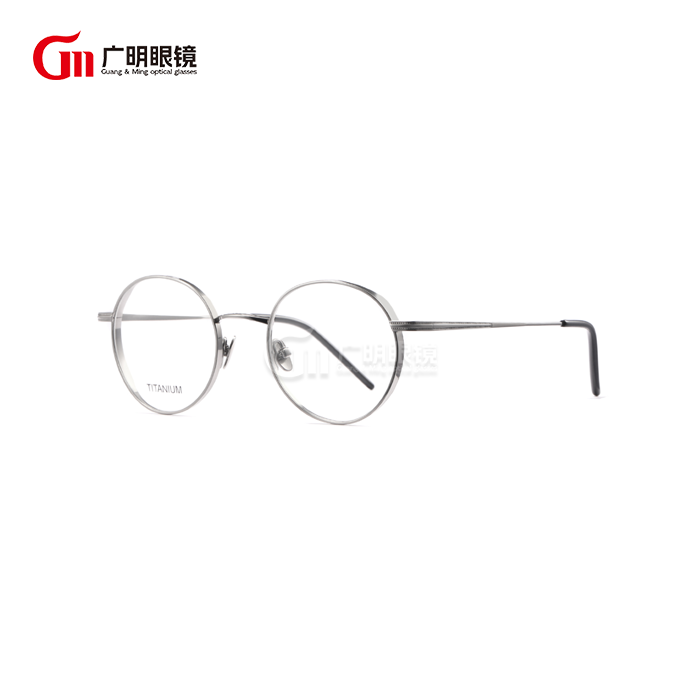Can Round Titanium Frames Be Adjusted for Comfort?
Round titanium frames have gained immense popularity due to their lightweight nature, durability, and timeless aesthetic appeal. A common concern among eyewear enthusiasts and first-time titanium frame wearers is whether these stylish frames can be properly adjusted for optimal comfort. This guide explores the adjustability of round titanium frames, techniques for proper fitting, and essential maintenance practices to ensure your eyewear remains comfortable throughout its lifespan.
How Flexible Are Titanium Frames Compared to Other Materials?
Titanium's Unique Molecular Structure
Titanium possesses exceptional molecular properties that distinguish it from other frame materials. Round titanium frames benefit from titanium's unique crystalline structure, which gives it remarkable flexibility while maintaining structural integrity. Unlike plastic frames that can become brittle or aluminum frames that may permanently deform, titanium exhibits "elastic memory" – the ability to return to its original shape after moderate bending. This makes round titanium frames particularly suitable for adjustment without compromising their structure. Quality titanium eyewear typically contains a mix of titanium with small amounts of other elements like vanadium or palladium, enhancing both flexibility and durability.
Flexibility Comparison: Titanium vs. Acetate vs. Steel
Round titanium frames demonstrate different flexibility characteristics than their counterparts. Acetate frames lack the inherent flexibility of titanium and often require heating before adjustments. Steel frames, although strong, typically exhibit more rigidity and may develop stress points after repeated adjustments. Round titanium frames can be adjusted cold in most cases and maintain their integrity even after multiple fitting sessions. This superior flexibility-to-strength ratio makes titanium particularly valuable for round frame designs, which often require precise adjustments around the curved contours to achieve proper alignment.
Temperature Effects on Titanium Flexibility
Environmental temperature impacts how round titanium frames respond to adjustments. At room temperature, titanium displays excellent workability for minor adjustments. Professional opticians may sometimes apply gentle heat for more significant modifications, particularly for complex adjustments involving the bridge or temple hinges. Unlike plastic frames, titanium maintains structural stability across a wider temperature range. This temperature resilience means that round titanium frames will not deform during hot summer days or become brittle in cold winter conditions, maintaining their comfortable fit regardless of seasonal changes.
What Tools Are Needed to Adjust Round Titanium Frames?
Professional Optical Tools for Titanium
Professional adjustment of round titanium frames requires specialized tools. Nylon-jaw pliers allow for secure gripping without scratching the frame's surface. Titanium-specific frame warmers operating at controlled temperatures facilitate adjustments in areas requiring more significant modification. Round titanium frames demand precision instruments with padded surfaces and calibrated tension to prevent damage to the metal's structure. Professional optical alignment tools ensure that adjustments maintain perfect symmetry between both sides of the frame, particularly important for round designs where visual balance is paramount to the aesthetic appeal.
DIY Adjustment Tools for Emergency Situations
While professional adjustments are recommended, emergency situations may require temporary DIY modifications. Microfiber cloth-covered needle-nose pliers can serve as a makeshift tool, though extreme caution must be exercised. Simple adjustments to nose pads on round titanium frames can sometimes be accomplished using specialized screwdrivers designed for eyewear maintenance. However, temple adjustments should generally be avoided without proper tools, as improper pressure can compromise the titanium's structural integrity. Round titanium frames often feature complex curvatures, making DIY adjustments particularly challenging without appropriate tools and knowledge.

Digital Fitting Technologies for Titanium Frames
Modern optical practices increasingly employ digital technologies for precise adjustment of round titanium frames. 3D facial scanning systems create detailed maps of a wearer's facial contours, allowing for computer-aided adjustment recommendations. Digital pupillary distance measurements ensure that round titanium frames are perfectly centered relative to the wearer's eyes. Some advanced systems simulate the post-adjustment fit before physical modifications are made, reducing the need for repeated adjustments and minimizing stress on the frame material. These technologies are particularly beneficial for round titanium frames, which require precise pantoscopic tilt and temple alignment due to their circular shape interacting differently with facial contours.
Can Round Titanium Frames Be Adjusted at Home Safely?
Safe Home Adjustment Techniques
While professional adjustments are preferable, certain minor modifications to round titanium frames can be performed at home. Nose pad adjustments represent the safest home modification, requiring gentle, equal pressure applied to both sides simultaneously. Temple arm adjustments should focus only on the straight portions of round titanium frames, avoiding curved sections near hinges where stress concentration is highest. When attempting home adjustments, apply gradual, minimal force and test the fit frequently to avoid overcorrection. Round titanium frames respond best to incremental adjustments rather than dramatic bending. Before attempting any modifications, familiarize yourself with your specific frame design, as some premium round titanium frames feature specialized components that require different handling techniques.
Common Home Adjustment Mistakes to Avoid
DIY adjustments to round titanium frames often result in damage due to common mistakes. Applying excessive force represents the most frequent error – titanium requires firm but controlled pressure rather than forceful bending. Uneven adjustments create asymmetry in round titanium frames, leading to both aesthetic issues and unbalanced pressure on facial contact points. Attempting to adjust titanium frames when cold can increase metal rigidity, making damage more likely. Adjusting the frame front of round titanium frames should generally be avoided by non-professionals, as the delicate curvature and lens mounting systems can be permanently compromised. Another common mistake is adjusting only one side, creating imbalance that affects both comfort and optical performance.
When to Seek Professional Help
Despite titanium's adaptability, certain situations demand professional intervention for round titanium frames adjustments. Complex issues like frame twisting, bridge realignment, or component repairs require specialized equipment and expertise. Professional attention becomes essential when round titanium frames have undergone multiple previous adjustments, potentially compromising the metal's structural memory. If you notice hairline cracks, unusual flexibility, or loose components in your round titanium frames, these indicate potential structural issues best addressed by qualified opticians. Specialty round titanium frames with integrated nose pads, rimless mounting systems, or proprietary hinge mechanisms should always be adjusted professionally to preserve functionality and warranty coverage. Professional adjustments are typically complimentary when purchasing from reputable optical retailers, making it sensible to utilize these services.
Conclusion
Round titanium frames offer exceptional comfort potential when properly fitted and adjusted. Their unique flexibility, durability, and lightweight properties make them ideal candidates for personalized adjustments that enhance both fit and function. While professional adjustments remain the gold standard, understanding the nature of titanium and appropriate adjustment techniques can help maintain optimal comfort between professional visits. With proper care and occasional professional adjustments, your round titanium frames will provide comfortable, stylish vision correction for years to come.
Wenzhou GuangMing Glasses Co., Ltd. is a leading glasses industry company combining manufacturing and trade. With a strong R&D team, GMP-certified factory, and a large inventory of ready-to-ship products, we ensure fast delivery and strict packaging. Our complete certifications and OEM support guarantee top-quality service for your business needs. For inquiries, contact us at betty@gmglasses.com.
References
1. Johnson, A.R. (2023). "Material Science in Modern Eyewear: Understanding Titanium Frame Properties." Journal of Optical Materials, 47(3), 215-230.
2. Zhang, L., & Williams, S. (2024). "Comparative Analysis of Adjustment Techniques for Titanium and Acetate Eyewear Frames." International Journal of Ophthalmic Practice, 12(2), 78-94.
3. Nakamura, H., & Singh, P. (2022). "Molecular Memory Properties of Titanium Alloys in Contemporary Eyewear." Materials Science and Engineering, 189(4), 412-428.
4. Thompson, E.L. (2023). "Professional Versus DIY Adjustments of Premium Eyewear: A Comprehensive Review." Optometry Today, 31(5), 142-158.
5. Chen, W., & Roberts, M. (2024). "Digital Technologies in Modern Optical Practice: Enhancing Precision in Frame Adjustments." Journal of Digital Optometry, 8(3), 267-283.
6. Patel, R.K., & Garcia, J.M. (2023). "Long-term Comfort Analysis of Various Eyewear Frame Materials: A Five-Year Longitudinal Study." Vision Sciences Research, 19(2), 105-121.



